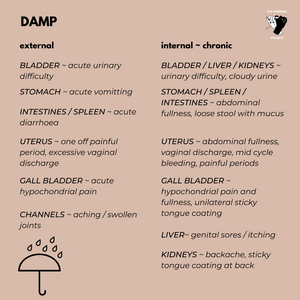I recently asked a question on my Instagram stories about the energetic value of plant-based dairy. Could it create damp, in the same way, dairy is considered to do, in Chinese Medicine?
The response was so enormous that I felt I could only do it justice with a blog response.
This blog post is not looking at the morality of veganism. About whether we should or should not eat animal products. It is to discuss vegan dairies energetic value according to Chinese Medicine.
Damp, when an internal pathogen, is considered to be formed by the Spleen not transforming and transporting and it can be particularly exacerbated by a sedentary lifestyle and a diet which injures Yang.

Signs and symptoms of Damp can be varied, but like mud on your boots, it is sticky, dirty and heavy.
So symptoms will reflect:
feelings of heaviness
a feeling of fullness / poor appetite
sticky tongue/taste
damp infuses downwards so signs may be more likely to occur in the lower half of the body
Specific signs and symptoms will depend on the organ involved. Some examples of this are:
Bladder / Liver / Kidneys - may have difficulty with urination, cloudy urine
Uterus - abdominal fullness, vaginal discharge, mid-cycle bleeding, painful periods
What exacerbates a predisposal to Damp?
Unfortunately for me, dairy products are high on the list of foods that should be avoided. I blooming love cheese.

Foods to avoid are:
Dairy products
Pork
Roasted peanuts
Concentrated juices
Bread
Yeast
Beer
Bananas
Sugars
Saturated fats
What are the results?
I was trying to cheat. Because I love dairy so much, I was hoping that swapping one for the other would be possible.
And overwhelmingly the answer is YES, PLANT-BASED DAIRY IS STILL DAMP FORMING (according to Chinese Medicine nutrition).
Here were your answers:
Dairy milk
Goats milk is considered to be not as damp forming as cows milk
It is now known that drinking more milk does not prevent fracture risk
Plant-based milk
Look at the sugar content of plant-based milk. They can have high content, which will also be damp forming
Almond and cashew are warming so best to avoid if you have damp tendencies
Conflicting opinions about coconut milk - one to be looked in to
Remember limit cold drinks/foods at this time of year, especially - this is also damp forming.
Avoid soy-based as they are damp-forming and increase oestrogen and prolactin
Vegan cheese
Can be quite oily - so best to limit quantities
Some recommendations for vegan cheese suppliers

What is the balance?
Unfortunately, I don't really have the answer for each specific person, but here is what I am going to remember.
Life is about balance - too much of anything is a bad thing. So I am going to try and cut out most dairy until December 24th (I mean Christmas is already pretty depressing during COVID, I refuse to make myself more miserable without a cheese board)! Listen to my body. See if my own signs and symptoms are better.
Other things to consider, should you think you have Damp signs and symptoms
Drink some lemon/hawthorn water to facilitate digestion - this will help Qi move
Balance eating less damp-forming foods and replacing them with foods which are considered good for Damp. Examples of this would be asparagus, anchovy, celery, garlic, turnip, plums - see the picture above for more examples.
Cutting out dairy, if you have symptoms of damp, is not the only thing that you will need to consider. Sugar, bananas, roasted nuts etc are all damp forming. You need to take an overall look at what and how you eat.
Veganism is brilliant for its diversification of the plants which you can eat and the increase in fibre. For the very excellent reason that no animals come to any harm and that it can be better for our planet. However vegan cheese and meats, in terms of nutritional value, can (and not always) be as unhealthy as eating the animal equivalent. Again, it is about balance. So maybe switching one for the other still requires as much constraint.
I'd love to know if you have any other thoughts on this subject. This is just the start of my investigation into this question.
If you have experience or know the answer, I'd love to hear from you.
Whilst I am here - I often have to remind myself of the differences between Damp & Phlegm.
I hope you found this useful.
Love your fave acupuncturist
Andrea










Comments